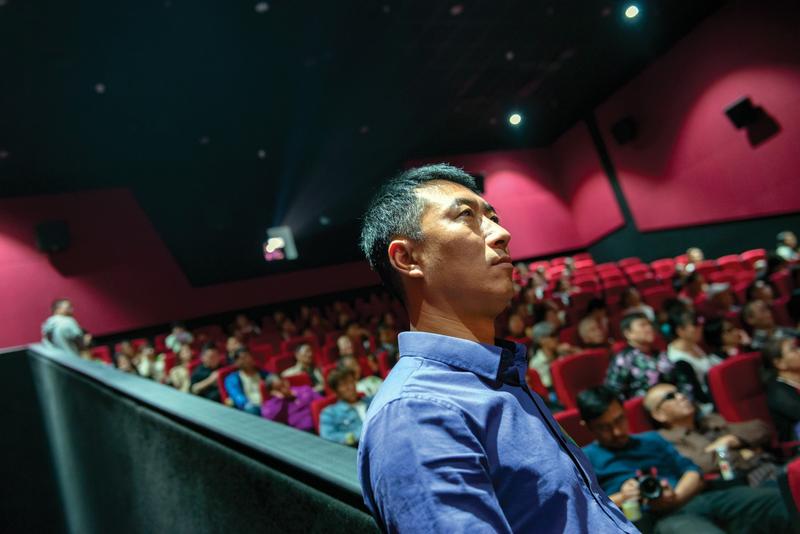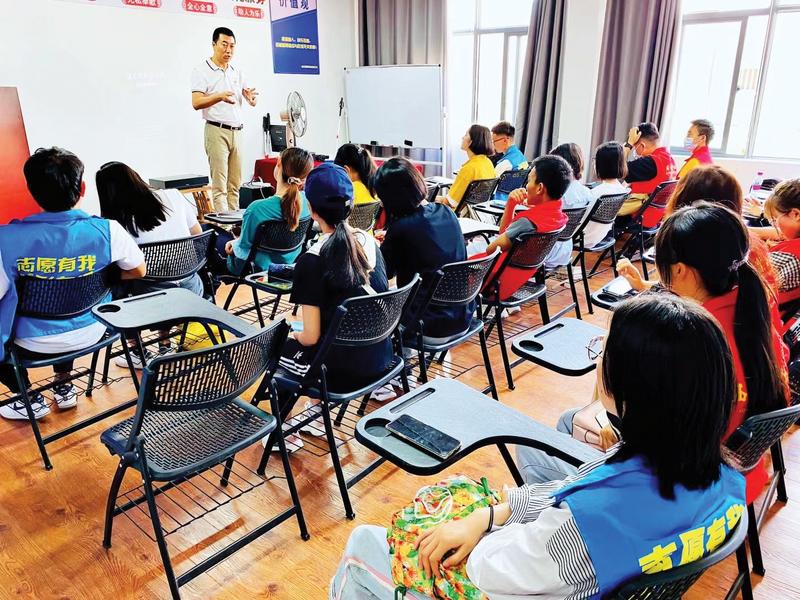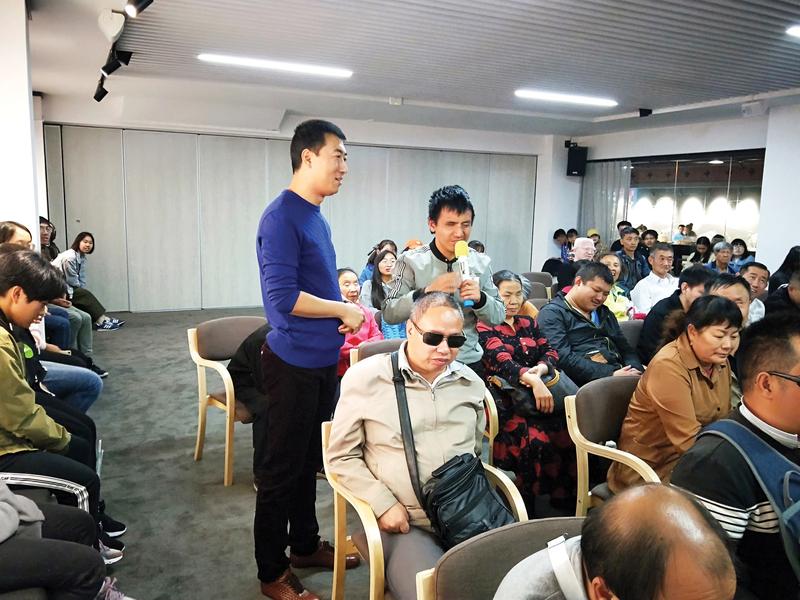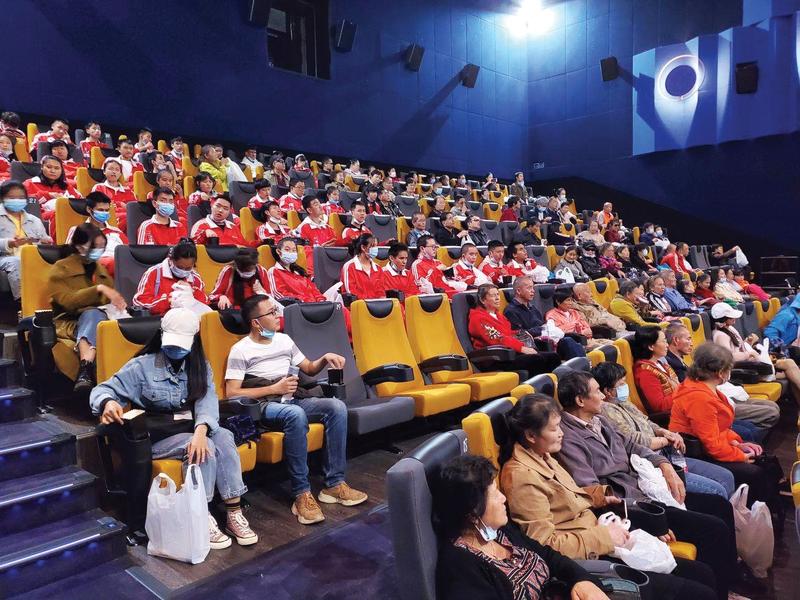 (WU HEPING / FOR CHINA DAILY)
(WU HEPING / FOR CHINA DAILY)
Every Saturday, Wang Fokun travels 40 minutes to watch a movie with friends.
Wang, 64, lost his sight in his early 50s after experiencing a high degree of myopia, but in the past two years, a “talking film” club has enabled him to regain his love for the cinema.
The club is in Kunming, capital of Yunnan province, where volunteers give vivid narrations to an audience comprising blind and partially sighted cinemagoers.
“I listened to a film for the first time in summer 2019, and it was great. I could fully understand the movie despite being blind. The volunteers do a great job,” said Wang, who watches films each week in the Yunfang Museum’s theater in Kunming.
Dozens of people attend the Saturday screenings organized by Xin Deng Theater, a group of volunteers who introduce films to blind audiences.
The volunteers use a surprisingly simple method. A narrator describes what is happening onscreen, including facial expressions, unspoken gestures, the setting and costumes.
The volunteers relay to the audience visual clues that would otherwise be missed, such as a sudden change of scenery from falling leaves to snow to mark the passing of time.
One volunteer, who wanted to be known only as Yifan, has narrated more than 20 movies, doing so for the first time to an audience of more than 80 in November 2019.
That afternoon, Yifan was nervous as he described a scene from the movie to a roomful of people as the movie projector whirred away.
 Zhou Quan, the founder of Xin Deng Theater, narrates a movie for a blind and visually impaired audience at a cinema in Kunming, Yunnan province, in 2019. (PHOTO PROVIDED TO CHINA DAILY)
Zhou Quan, the founder of Xin Deng Theater, narrates a movie for a blind and visually impaired audience at a cinema in Kunming, Yunnan province, in 2019. (PHOTO PROVIDED TO CHINA DAILY)
Yifan said the audience members immersed themselves in the movie, laughing when something funny happened or sighing during sad scenes.
“I could sense they were enjoying the film. I was so glad that I could bring enjoyment to my audience by narrating the movie,” said Yifan, who is also a standup comedian. “I felt as though I was shining a different light on their lives.”
Explaining films to a blind audience can be challenging, especially for inexperienced volunteers.
Yifan said that if he cannot complete the introduction to one scene before the characters start talking in the next, the trick is to wait until the end of the dialogue, go back to the previous scene and then explain the new one.
This requires a narrator to be familiar with all the plots and scenes in a movie. “I watch a film at least three or four times and write down details of the script,” he said.
Volunteers for the “talking movie” club learned their narrating skills from Zhou Quan, the founder of Xin Deng Theater.
Zhou, who was born in Beijing, traveled to Yunnan in 2010 to start his own business after working for years as a sales manager. Inspired by Xin Mu Theater in Beijing — a small group of volunteers who were the first to introduce films to blind audiences in China — he founded Xin Deng Theater in Kunming in 2017 and has narrated more than 100 films for thousands of blind moviegoers.
“Movies are for everybody. Just because somebody is blind doesn’t mean they can’t enjoy a film,” Zhou said. “Xin Deng Theater wants to help such people watch movies and to light up their lives.”
 Volunteers take a training course in Kunming. (PHOTO PROVIDED TO CHINA DAILY)
Volunteers take a training course in Kunming. (PHOTO PROVIDED TO CHINA DAILY)
Many television and video companies have adopted narrated versions of productions in recent years, transforming onscreen action into the spoken word for blind audiences.
Outside of China early this year, HBO Max added audio descriptions to 1,500 hours of its movies and TV shows to help blind and poorly sighted audiences. In China, Beijing Gehua CATV Network and Communication University of China have jointly made hundreds of movies with audio descriptions.
However, Zhou believes that an “embedded voice” is not as good as an onsite one, which is interactive and can evoke the “feeling of presence”.
In addition, Zhao said Xin Deng Theater is far more than just a venue to present movies. It is a place where the visually challenged can meet, talk and make friends with one another.
“It also gathers people with common interests, who get to know each other. One time, we had a romantic story. A young man and a young woman, both visually impaired, met in our movie hall and later got married. They are living happily together,” the 45-year-old added.
In China, more than 17 million people are visually impaired, and about 8 million of them are totally sightless, according to the China Association of the Blind.
Over the past decade, cities nationwide have built more walkways for the blind, added Braille markings on elevator panels and permitted blind candidates to take exams for government jobs and colleges.
 A blind audience member gives his view of a movie narration. (PHOTO PROVIDED TO CHINA DAILY)
A blind audience member gives his view of a movie narration. (PHOTO PROVIDED TO CHINA DAILY)
Peng Bin, head of the association for the blind in Kunming, said, “The blind community still has limited opportunities to take part in cultural activities.
“Xin Deng Theater is a great project that focuses on visually impaired people’s cultural lives, rather than just the basics of living. Philanthropic programs such as this are pioneers across the country, especially in developing areas such as mountainous Yunnan province.
“Disabled people and their various needs should be recognized by society. Such people are keen to get an education, enjoy movies and occasionally travel outside their hometowns. All this is important for them to live better lives.”
Zhou said that, in 2018, he took more than 40 visually impaired people to Beijing for a one-week trip. They walked the Great Wall and the city’s ancient alleyways. Local trips were also organized for them.
After getting to know his many new friends, Zhou found they needed more than just one movie every week.
“People who cannot see live different lives to we sighted people. They only see the darkness of the world, which inevitably leads them to be more passive. We have such a big population in China — what if everyone came to help them?
“I have also found that most people have no idea how they can help. For example, how many sighted people know how to greet a blind person on the street and guide him or her across the road?
“You cannot shout out ‘hey, what can I do for you?’ because they don’t know you are talking to them. The right way is to touch the blind person on the forearm as a greeting and then say you can help,” Zhou said.
 Blind and partially sighted moviegoers enjoy a narrated film at a cinema in Kunming. (PHOTO PROVIDED TO CHINA DAILY)
Blind and partially sighted moviegoers enjoy a narrated film at a cinema in Kunming. (PHOTO PROVIDED TO CHINA DAILY)
More than 5,000 volunteers at the “talking film” club, most of them university students, have been trained in the basic skills needed to help the visually impaired, said Zhou, who has also uploaded a series of video clips to teach communication skills online to blind people.
Liu Fang, a senior official from the China Social Welfare Foundation, called for more efforts to improve the lives of those with disabilities.
“Our organization is paying more attention to people with disabilities, with the focus being broadened from improving their living conditions to enriching their cultural lives. That’s great, but there’s still a long way to go,” Liu said.
“The fire burns higher when everybody adds fuel. We need more efforts, not just from the government but also from companies and individuals, to help those in need. Only in this way can public welfare projects such as Xin Deng Theater endure,” she said.
The foundation is working with Zhou’s team on projects aimed at bolstering the psychological health of blind masseurs.
“I am preparing to livestream our movie narrations. As a businessman, I want to do more than just earn a living,” Zhou said.


